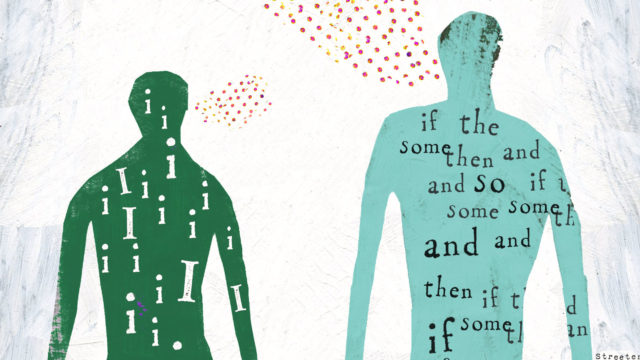Folium: Our Use Of Little Words Can, Uh, Reveal Hidden Interests via NPR
…
Connect
…
Audio
…
Imagine a time where you have been to a very crowded place and have heard the roar of people talking around you. In that roar there is a constant mix of words; vowels, consonants, verbs, nouns. Unless you listen to a specific conversation, all of it just sounds like a bunch of mumbo jumbo. Alix Spiegel decided to find out what exactly this mumbo jumbo consisted of. She begins her article using the example of when she overheard a group of men and women talking in a hotel restaurant. She states that they lined up in a row of tables, talked for a while with a specific person, then would rotate every three minutes. There was a consistency of people talking over people talking over more people. She wondered what they were saying and what we could learn from what they were saying. Alix decided to call up her friend James Pennebaker, who is a psychologist interested in the “secret life of pronouns.”
…
[Could you tell if someone was lying by carefully analyzing the way they used function words?]
[Looking only at a transcript, could you tell from function words whether someone was male or female, rich or poor?]
[What could you tell about relationships by looking at the way two people spoke to each other?]
…
Pennebaker focuses on the words that transition the human language from sentence to sentence, or so called “function words.” For example these words: The, This, Though, I, And, An, There, and That. Pennebaker says that “Function words are essentially the filler words, these are the words that we don’t pay attention to, and they’re the ones that are so interesting.” Pennebaker says that we organize language by the words that we more often focus in conversation. The words we focus on most are content words, words like “school,” “family,” “live,” “friends.” Those types of words are what give us context and an image to go off of when listening to the story. I speak Spanish, and at the beginning of my learning stages, I related to Pennebaker when he claimed in frustration that he was also just trying to find out what they are talking about. It is best to listen to ‘what, where, when’ — the big content-heavy words. Pennebaker says that all of the little words in between, he didn’t listen to because they’re too complex to listen to.
…
(I added this video for pure entertainment. Enjoy. – Ed.)
…
One of the things that Pennebaker recorded and transcribed were conversations that took place between people on speed dates. He fed these conversations into his program that he came up with at Texas State University, Austin called Linguistic Inquiry and Word Count. This program was able to tell if someone was lying by carefully analyzing the way they used function words, looking only at a transcript if you tell from function words whether someone was male or female, rich or poor, and what could be told about relationships by looking at the way two people spoke to each other. What he found surprised him.”We can predict by analyzing their language, who will go on a date — who will match — at rates better than the people themselves,” he says. Specifically, what Pennebaker found was that when the language style of two people matched, when they used pronouns, prepositions, articles and so forth in similar ways at similar rates, they were much more likely to end up on a date. Thanks to Pennebaker we now have a fuller understanding of how our language works in order for us to communicate how we want, or how Pennebaker puts it, ”using our simplest words as a window into our souls.”
…
…
Julie Martin
LEAF Editor & Contributor
…

